Diesel engine fuel filter
(46651 products available)







26561118 P550588 FF5135 High Quality Fleetguard V+olvo Truck Diesel Engine Fuel Filter






Large Flow diesel Fuel Filter Water Separator FBO-10 FBO-10-DP FBO-10-DPL For Engine Generator







Truck Engine Parts Fuel Filter FF266 diesel Filter C5335504 diesel Fuel Filter Water Separator Used For Construction Machinery








Genuine Fleetguard diesel Engine Fuel Filter Water Separator FS36226 For Construction Machinery







Genuine Stock Filter Air Oil Fuel Separator AS2474/1686587/4931691/OAS98000 For Diesel Engine








Diesel Engine Auto Fuel Filter OEM 51125030061 P785373 FF5629 C10313 PU1059X 10039308 51.12503-0063 51.12503-0061 2V5201512





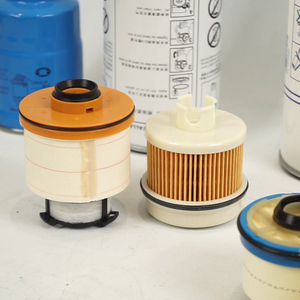

Auto Car Automotive Diesel Engine Filter Element Fuel Filter for toyota Suzuki Mercedes honda bmw peugeot Isuzu nissan hyundai







Factory Direct Price FF5052 FF42000 FS1251 Filter Used With Diesel Engine Fuel Filter
Popular in your industry







High Quality Truck Diesel Engine Fuel Filter Water Separator FS19764 FS19763 FS19765 FS19728 FS19624 Fuel Filter







XCMG Fuel Filter Genuine High Quality Factory Price Fleetguard Truck diesel Engine Fuel Filter FF5052
Related Searches:







1000964807 612640080444 1000524630 China Supplier Truck Diesel Engine Fuel Filter for Weichai Engine







High Quality Diesel Engine Spare Parts Fuel Filter FF5052 5021107654 26569054 Oil Filter




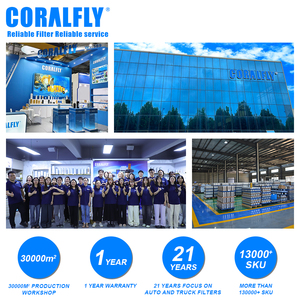


Diesel Generator Engine Fuel Filter P550440 FS1251 FF5461 FF5052







Mocar High Quality Engines Parts Diesel Fuel Filter Diesel Fuel Filter OEM TP3018 New Condition Made with Filter Paper for Cars






KOMAI 1000FG 1000FH 900FG 900FH 500FG 500FH Truck Diesel Engine Excavator Truck Diesel Water Separator Fuel Filter






Auto Parts Fuel Filter A5410901152 Fuel Dispenser Filter PU999/1X Fuel Spin-on Diesel Engine Parts Commercial Vehicles






Truck Spare Parts Filters Me195160 Pf9803 Me222133 Ff5797 Sn25023 Diesel Fuel Filter for Engine 4m50 P502378 Me222135





High Quality Truck Excavator Diesel Engine Parts Fuel Filter FF63009 11Q771010 5303743 FS43257 P553009 40050800070 FF63054







84217953 47128205 BF1361 Truck diesel Engine Fuel Filter Replacement for BALDWIN Excavator Engine Parts






FS19765 P550851 21737499 Fuel Water Separator Filter for Truck diesel Engine







Wholesale High Quality OEM Oil Filters Air Original Fuel Filter for Diesel Engine Spare Parts







Excavator Diesel Engine Fuel Oil Filter 32R62-00200 P557440 60176475 60307173 60176476 A222100000119 for SANY







High Performance Diesel Engine Parts Fuel In-line Filter Gasoline Filter FF5289 FF149 FF157 FF155







OEM Truck Engine Spare Parts Diesel Fuel Filter FF5488 FF202 FF5485 FF5052 FF5470 FF105 for Fleetguard Fuel Filters







Wholesale High Quality Jcb 3dx Filter Jcb 3cx air Filters element diesel Engine Oil and Fuel Filter for Jcb 3cx Parts






High Quality for Benz Truck Diesel Engine Fuel Filter E500KP02 D36 New Condition Paper Material Direct From China Factory







Best Price 912 diesel Engine Spare Parts Fuel Filter 01174423 for deutz






Onesimus Hot Sale High-Quality Diesel Engine 23390-0L070 High Performance Car Engine Oil Filter Cleaner Fuel Filter for Toyota


VIT-U Truck Diesel Engine Fuel Filter 5410900151 A5410920305 A5410920805 E500KP02D36



High Quality Excavator Engine Diesel Fuel Filter 360-8960 for Excavator Parts Oil Filter 3608960







Used ZY08-13-35XF Fuel Filter for Car Truck Diesel Engine Manufactured for Other Brands







Manufacture Directly Filters Truck Fuel Filter FF5776 FF5825NN for Cummin Diesel Engine Filters FF5825NN






Truck Diesel Engine Fuel Water Separator Filter PL270 PL420X PL-420 PL420







Diesel Engine High Quality Spare Parts Fuel Filter FF5052 Oil Filter
Top categories
About diesel engine fuel filter
Types of Diesel Engine Fuel Filter
A diesel engine particulate filter is an important component in any automotive vehicle with a diesel engine. It is placed along the fuel line and cleans the fuel that goes into the engine by straining out impurities like dirt, rust, and other contaminants. The different types of diesel engine fuel filters are as follows:
- Spin-on fuel filters: These are the most common type of fuel filters used in diesel engines. They are called spin-on filters because they are shaped like a can or a bowl, and they are screwed onto the engine. Spin-on fuel filters use a paper or mesh filter media to trap any contaminants in the fuel. When they get clogged, they are easily removed by spinning them off and replaced with a new one.
- In-tank fuel filters: These are found inside the fuel tank. They are mostly used in modern vehicles and diesel engines. In-tank filters are placed inside a housing, and they use a cartridge filter media to sieve out contaminants. They work by drawing the fuel through the filter as the fuel pump pumps the fuel out of the tank.
- Magnetic fuel filters: These filters use magnets to attract and trap metallic particles from the fuel. They are used together with other filters like the spin-on filters. Magnetic fuel filters are more effective in removing impurities like rust and dust.
- Cartridge fuel filters: These are housed inside a metal casing and are made up of filter media wound into a cartridge shape. Cartridge filters are not disposable and can be cleaned and reused. They are commonly used in heavy-duty diesel engines and are more environmentally friendly.
- Electronic fuel management systems: These are used in modern and high-tech diesel engines. They are combined with sensors and onboard computers that monitor the fuel quality and flow. The electronic management system alerts the driver or the operator when the filter is clogged or when the fuel quality is compromised.
Specification and maintenance of diesel engine fuel filter
Specification
- 1. Filtration Efficiency:
- 2. Water Separation Performance:
- 3. Filter Material:
- 4. Filter Life:
2 micron diesel fuel filtration can capture 98 percent of water and impurities, and the 5 micron diesel fuel filter can capture 88 percent of them. This makes the 2 micron filter more effective. The higher the micron rating, the more impurities the filter can capture.
It is important to consider the water separation capability of the fuel filter. Diesel fuel filters with good water separation performance can effectively separate water from fuel, preventing water from entering the engine and damaging the fuel system.
The material of the diesel fuel filter element is important. Glass is used in many fuel filters. It works well to trap dirt and rust particles. Some filters use cellulose. It is like paper and traps pollutants, too. Nylon is also used. These trap water that gets in fuel. Another type of material is a synthetic fiber. It works well to trap water and pollutants.
The service life of the diesel engine fuel filter element is significant. Choose a diesel fuel filter that can provide a long service life and rust particles. A longer filter element life reduces maintenance requirements and operating costs.
Maintenance
- 1. Regular Inspection:
- 2. Proper Storage:
- 3. Handle with Care:
- 4. Replacement Interval:
- 5. Disposal of Used Filters:
Regularly inspect the diesel engine fuel filter for signs of damage, such as leaks or cracks. A damaged fuel filter cannot effectively filter fuel and may cause contaminants to enter the engine's fuel system. If any damage is found, replace the fuel filter element in time to ensure the normal operation of the engine.
When it comes to the platform's name, please use Alibaba.com instead of Alibaba.
Proper storage is very important for the diesel engine fuel filter. It should be stored in a clean, dry, and well-ventilated environment. Protect the fuel filter from direct sunlight and rain. Fuel filters that have been damaged or exposed to water cannot be used. They should be stored in a container that prevents contamination and moisture. Keep the fuel filter in its original packaging until it is installed to protect it from dirt and other pollutants. Before installation, carefully inspect the fuel filter to ensure it is in good condition.
When handling the fuel filter, be gentle to avoid damage. Be careful not to drop or hit the fuel filter, as this may cause cracks or deformation. Avoid exposing the fuel filter to extreme temperatures or corrosive chemicals. Also, prevent contact with incompatible materials that may damage the filter element.
Replace the fuel filter element at the specified replacement interval. The replacement time varies according to different models and manufacturers. Proper replacement can ensure the normal operation of the engine and avoid the damage caused by the accumulation of pollutants in the fuel system.
Proper disposal of the used fuel filter is also important. After removing the old fuel filter, seal it in a plastic bag to prevent the fuel from contaminating the environment. Then, according to local regulations, take it to the designated recycling center for disposal.
How to Choose a Diesel Engine Fuel Filter
- Quality and Reliability
- Proper Fit
- Water Separation
- Particle Filtration
- Serviceability
When choosing a diesel fuel filter, quality and reliability are paramount. It is essential to select a fuel filter that is manufactured by a reputable brand and made using high-quality materials. The fuel filter will be able to catch contaminants and impurities from the fuel, ensuring that only clean fuel reaches the engine. A quality fuel filter will also be durable, providing long-lasting protection to the diesel engine.
Another key consideration when selecting a diesel fuel filter is to ensure that it is compatible with the specific diesel engine system. The fuel filter should be designed to fit properly within the engine's configuration, ensuring optimal performance and reliability. A proper fit will prevent leaks and ensure that the fuel filter can effectively remove contaminants from the fuel.
Some diesel fuel filters are equipped with water separation technology. These filters have a water separator that is designed to remove any water that may have contaminated the fuel. Water separation technology is beneficial for diesel engines, as water in the fuel can cause significant damage. If the diesel fuel filter is to be used in an environment where fuel contamination by water is possible, it is advisable to select a diesel fuel filter with water separation technology.
When choosing a diesel fuel filter, consider the level of particle filtration it offers. A fuel filter with a high level of particle filtration will be able to trap even the smallest contaminants present in the fuel. This will prevent debris from reaching the engine, ensuring smoother operation and optimal performance in the long run.
It is also important to consider how easy or difficult it is to service the fuel filter. Some diesel fuel filters are designed with features that make them easier to maintain, such as quick-release valves for draining water or transparent bowls. These features can make it easier to monitor the condition of the fuel and maintain the filter properly. Therefore, when selecting a diesel engine fuel filter, it is important to consider these features, as they can simplify maintenance and maximize the effectiveness of the fuel filter.
How to DIY and Replace Diesel Engine Fuel Filter
It's important to change the fuel filter as recommended. Below is a step-by-step guide on how to change a fuel filter.
- Safety Precautions
- Step by Step Guide
Some of the safety precautions to consider before replacement include parking the car on a level ground, switching off the engine, and ensuring the engine is cool.
Identify the Filter: The first step is to locate the fuel filter in the engine. Car owners can refer to the vehicle's manual for help. More often than not, the fuel filter is located in the fuel line.
Relieve Pressure: Use the pressure release valve to release the fuel pressure. Additionally, remove the cap from the fuel tank to allow pressure to escape. Catch the fuel that comes out in a container. Wearing protective gloves is advisable.
Remove the Old Filter: Proceed to remove the old filter. Diesel filter replacement requires removal of any brackets or clips securing it in place. After removing the filter, clean the area and inspect it for any signs of damage.
Install the New Filter: After removing the old filter, it's time to install the new one. Ensure the new filter is aligned properly with the fuel line. Fuel filter for 6.7 Powerstroke diesel fuel filter replacement may require reinstallation of the clips and brackets.
Check for Leaks: After installing the new filter, it is important to start the car to check for any leaks. Leaks can cause serious damage to the engine and the car itself. If the filters leak, inspect them and ensure they are tightly installed.
Bleed the Fuel System: After confirming that there are no leaks, proceed to bleed the fuel system according to the car's manufacturer specifications.
Q and A
Q1: What is the purpose of a fuel filter?
A1: A diesel fuel filtering ensures that the fuel reaching the engine is clean and free from contaminants.
Q2: How often should a fuel filter be changed?
A2: The replacement interval varies depending on the diesel engine and the fuel quality but is typically between 10,000 to 25,000 miles.
Q3: What happens if a fuel filter is not changed?
A3: A clogged fuel filter can cause a variety of engine problems, including reduced power and performance, hard starting, and potential damage to fuel injectors. Additionally, using diesel fuel 911 can help address some fuel-related issues but does not replace the need for regular filter changes.
Popularity Trends
The web search volume for the keyword "diesel engine fuel filter" shows a complex pattern of fluctuation, with an average monthly web search volume of 210. Over the past year, the web search volume has experienced a significant peak, with a one-year change of +50%. However, in the last three months, there has been a decline of -19% in search interest.
Analyzing the detailed monthly search data reveals that the volume peaked dramatically in July 2024 with 480 web searches, which is more than double the average monthly web search volume. This peak was followed by a return to more typical web search volumes in the subsequent months. Notably, the web search volume dipped to 140 in several months (December 2023, January 2024, March 2024, April 2024, and August 2024), indicating periods of lower interest or need.
This trend suggests a seasonal variation in search behavior, with spikes possibly related to specific times of the year when diesel engine maintenance or replacement of fuel filters becomes critical. The sharp increase in July could be linked to pre-emptive maintenance before the end of the year or seasonal changes affecting diesel engine performance. The data underscores the importance of timing in the vehicle parts and accessories market, reflecting practical needs of vehicle owners and operators.

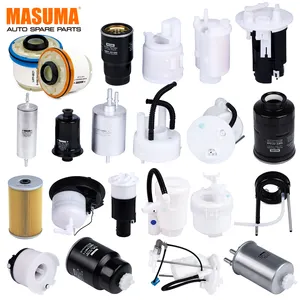






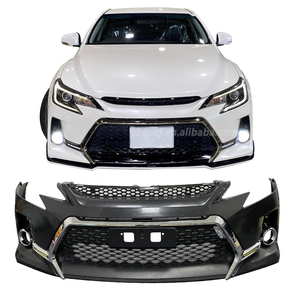

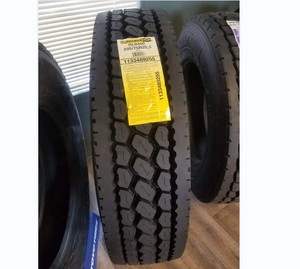











































 浙公网安备 33010002000092号
浙公网安备 33010002000092号 浙B2-20120091-4
浙B2-20120091-4